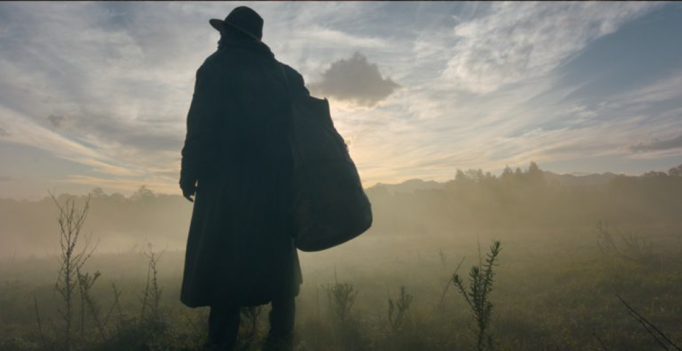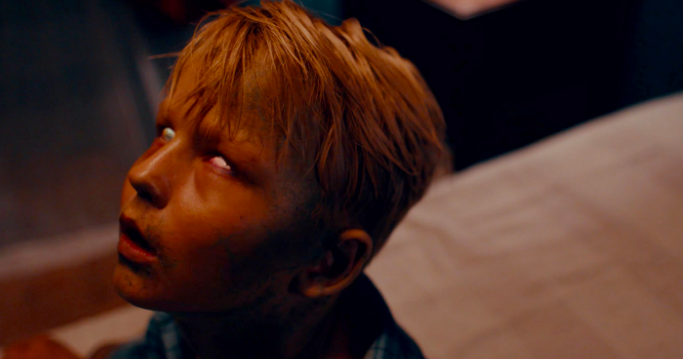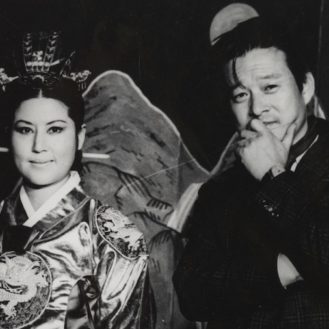8 (DIR. Harold Holscher)
Horror can be found just about anywhere, however not all horror is equal. This is why films that incorporate real-life horrors must be particularly aware of how they incorporate the various elements. Former TAD presentation Under the Shadow is a great example of how to do this correctly. But, this is why Harold Holscher’s 8 is so conflicting. It doesn’t really have much to say about its source events, creating a final product that’s lacking.
Taking place in apartheid-era South Africa, 8 tells the story of a white family who move into a handed-down house, suddenly finding themselves in the acquaintance of a seemingly kindly black man who begins working for them before things start going wrong. There is also a village nearby inhabited by black South Africans who appear to be aware of exactly why these things are going wrong. Due to the setting of the film, the races of the individuals are inherently important, which tends to make some things come across as a little uncomfortable. Some scenes, which could have been masterpieces of tense filmmaking in another time and another place, suddenly appear to be saying things that the film’s conclusion suggests they don’t mean. 8 is not a racist film, but its context walks the line.
Outside of this context, the film is remarkable from a formal perspective. The mythology apparent throughout the film—whether invented for the film or adapted from real myths—is incredibly tense. Credit should be awarded to the cinematography, the set design, and the incredibly natural performances of the African villagers. This formalist approach, however, is also partially responsible for the film’s downfall – it’s symbolic to a fault. At a certain point, the symbolism stops representing anything, leaving the film to be an unfulfilling jumble and its fascinating ending to be practically nonsensical.
8 is great in many ways (some well-done jump scares included), but it’s missing some significant pieces.
**********
The Assent (DIR. Pearry Teo)
The Assent tells the story of Joel (Robert Kazinsky), a man whose son, Mason (Caden Dragomer), is possessed by the devil himself, Lucifer. Mistaking this for schizophrenia early on, Joel eventually seeks the aid of Father Lambert (Peter Jason), a priest who has recently been released from prison after serving time for killing a five-year-old during an exorcism.
The religious possession horror movie is nothing new. There is a great cinematic history of this narrative, often with overt religious themes, but these are often incorporated gracefully, which makes them more palatable and less preachy – not so much here.
The screenplay – which seems to be at war with itself – is chock-full of expository dialogue that the actors have difficulty with, despite turning in competent performances. Atmospherically, The Assent fumbles its frights (the jump scares are confusing and laughable), and the set design, despite showing promise with increasing ominous tones, isn’t fully realized. An awfully weak finale seals this film’s fate as skippable horror fodder.
**********
The Mortuary Collection (DIR. Ryan Spindell)
Anthology films are tricky. Even the best ones have weak links that hold them back from being perfect, sticking out like sore thumbs for the viewer. This is why Ryan Spindell’s The Mortuary Collection is so remarkable: the stories within the anthology are far from perfect and yet the final product manages to forgo the curse of the anthology, ultimately coming out way better than the sum of its parts.
The Mortuary Collection is a riff on the Tales from the Crypt paradigm, wherein the creepy owner of the local funeral home, Montgomery Dark (Clancy Brown), tells the stories of people who have come to his place of business post-mortem to a potential employee, Sam (Caitlin Fisher). These stories allow the filmmakers to incorporate a variety of disparate elements; from tentacles and body horror to slashers and more “real” horrors. All the stories are good albeit imperfect, but the aesthetics, the call backs, the narratives within narratives, and especially the constant critique of the very concept of storytelling upgrade Spindell’s film to a cohesive, refreshing unit.
The Mortuary Collection also has a beautiful distinct look (imagine the Cryptkeeper’s classic aesthetics by way of Archie comics – dated yet timeless). Brown and Fisher, along with the supporting actors, efficiently pace the film, while the inventive dark humour and violence makes the film stand out even more.
In short, The Mortuary Collection is irresistible.
**********
For more information on the festival, visit the official Toronto After Dark website.
Do You Tweet? Follow These Tweeple:
Toronto After Dark: @TADFilmFest
Shahbaz Khayambashi: @Shakhayam







Leave a comment